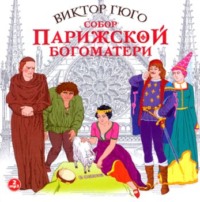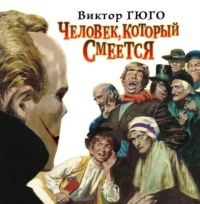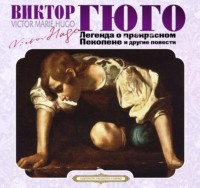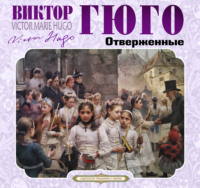 полная версия
полная версияLes Misérables
The hole through which Gavroche had entered was a breach which was hardly visible from the outside, being concealed, as we have stated, beneath the elephant’s belly, and so narrow that it was only cats and homeless children who could pass through it.
“Let’s begin,” said Gavroche, “by telling the porter that we are not at home.”
And plunging into the darkness with the assurance of a person who is well acquainted with his apartments, he took a plank and stopped up the aperture.
Again Gavroche plunged into the obscurity. The children heard the crackling of the match thrust into the phosphoric bottle. The chemical match was not yet in existence; at that epoch the Fumade steel represented progress.
A sudden light made them blink; Gavroche had just managed to ignite one of those bits of cord dipped in resin which are called cellar rats. The cellar rat, which emitted more smoke than light, rendered the interior of the elephant confusedly visible.
Gavroche’s two guests glanced about them, and the sensation which they experienced was something like that which one would feel if shut up in the great tun of Heidelberg, or, better still, like what Jonah must have felt in the biblical belly of the whale. An entire and gigantic skeleton appeared enveloping them. Above, a long brown beam, whence started at regular distances, massive, arching ribs, represented the vertebral column with its sides, stalactites of plaster depended from them like entrails, and vast spiders’ webs stretching from side to side, formed dirty diaphragms. Here and there, in the corners, were visible large blackish spots which had the appearance of being alive, and which changed places rapidly with an abrupt and frightened movement.
Fragments which had fallen from the elephant’s back into his belly had filled up the cavity, so that it was possible to walk upon it as on a floor.
The smaller child nestled up against his brother, and whispered to him: —
“It’s black.”
This remark drew an exclamation from Gavroche. The petrified air of the two brats rendered some shock necessary.
“What’s that you are gabbling about there?” he exclaimed. “Are you scoffing at me? Are you turning up your noses? Do you want the Tuileries? Are you brutes? Come, say! I warn you that I don’t belong to the regiment of simpletons. Ah, come now, are you brats from the Pope’s establishment?”
A little roughness is good in cases of fear. It is reassuring. The two children drew close to Gavroche.
Gavroche, paternally touched by this confidence, passed from grave to gentle, and addressing the smaller: —
“Stupid,” said he, accenting the insulting word, with a caressing intonation, “it’s outside that it is black. Outside it’s raining, here it does not rain; outside it’s cold, here there’s not an atom of wind; outside there are heaps of people, here there’s no one; outside there ain’t even the moon, here there’s my candle, confound it!”
The two children began to look upon the apartment with less terror; but Gavroche allowed them no more time for contemplation.
“Quick,” said he.
And he pushed them towards what we are very glad to be able to call the end of the room.
There stood his bed.
Gavroche’s bed was complete; that is to say, it had a mattress, a blanket, and an alcove with curtains.
The mattress was a straw mat, the blanket a rather large strip of gray woollen stuff, very warm and almost new. This is what the alcove consisted of: —
Three rather long poles, thrust into and consolidated, with the rubbish which formed the floor, that is to say, the belly of the elephant, two in front and one behind, and united by a rope at their summits, so as to form a pyramidal bundle. This cluster supported a trellis-work of brass wire which was simply placed upon it, but artistically applied, and held by fastenings of iron wire, so that it enveloped all three holes. A row of very heavy stones kept this network down to the floor so that nothing could pass under it. This grating was nothing else than a piece of the brass screens with which aviaries are covered in menageries. Gavroche’s bed stood as in a cage, behind this net. The whole resembled an Esquimaux tent.
This trellis-work took the place of curtains.
Gavroche moved aside the stones which fastened the net down in front, and the two folds of the net which lapped over each other fell apart.
“Down on all fours, brats!” said Gavroche.
He made his guests enter the cage with great precaution, then he crawled in after them, pulled the stones together, and closed the opening hermetically again.
All three had stretched out on the mat. Gavroche still had the cellar rat in his hand.
“Now,” said he, “go to sleep! I’m going to suppress the candelabra.”
“Monsieur,” the elder of the brothers asked Gavroche, pointing to the netting, “what’s that for?”
“That,” answered Gavroche gravely, “is for the rats. Go to sleep!”
Nevertheless, he felt obliged to add a few words of instruction for the benefit of these young creatures, and he continued: —
“It’s a thing from the Jardin des Plantes. It’s used for fierce animals. There’s a whole shopful of them there. All you’ve got to do is to climb over a wall, crawl through a window, and pass through a door. You can get as much as you want.”
As he spoke, he wrapped the younger one up bodily in a fold of the blanket, and the little one murmured: —
“Oh! how good that is! It’s warm!”
Gavroche cast a pleased eye on the blanket.
“That’s from the Jardin des Plantes, too,” said he. “I took that from the monkeys.”
And, pointing out to the eldest the mat on which he was lying, a very thick and admirably made mat, he added: —
“That belonged to the giraffe.”
After a pause he went on: —
“The beasts had all these things. I took them away from them. It didn’t trouble them. I told them: ‘It’s for the elephant.’”
He paused, and then resumed: —
“You crawl over the walls and you don’t care a straw for the government. So there now!”
The two children gazed with timid and stupefied respect on this intrepid and ingenious being, a vagabond like themselves, isolated like themselves, frail like themselves, who had something admirable and all-powerful about him, who seemed supernatural to them, and whose physiognomy was composed of all the grimaces of an old mountebank, mingled with the most ingenuous and charming smiles.
“Monsieur,” ventured the elder timidly, “you are not afraid of the police, then?”
Gavroche contented himself with replying: —
“Brat! Nobody says ‘police,’ they say ‘bobbies.’”
The smaller had his eyes wide open, but he said nothing. As he was on the edge of the mat, the elder being in the middle, Gavroche tucked the blanket round him as a mother might have done, and heightened the mat under his head with old rags, in such a way as to form a pillow for the child. Then he turned to the elder: —
“Hey! We’re jolly comfortable here, ain’t we?”
“Ah, yes!” replied the elder, gazing at Gavroche with the expression of a saved angel.
The two poor little children who had been soaked through, began to grow warm once more.
“Ah, by the way,” continued Gavroche, “what were you bawling about?”
And pointing out the little one to his brother: —
“A mite like that, I’ve nothing to say about, but the idea of a big fellow like you crying! It’s idiotic; you looked like a calf.”
“Gracious,” replied the child, “we have no lodging.”
“Bother!” retorted Gavroche, “you don’t say ‘lodgings,’ you say ‘crib.’”
“And then, we were afraid of being alone like that at night.”
“You don’t say ‘night,’ you say ‘darkmans.’”
“Thank you, sir,” said the child.
“Listen,” went on Gavroche, “you must never bawl again over anything. I’ll take care of you. You shall see what fun we’ll have. In summer, we’ll go to the Glacière with Navet, one of my pals, we’ll bathe in the Gare, we’ll run stark naked in front of the rafts on the bridge at Austerlitz, – that makes the laundresses raging. They scream, they get mad, and if you only knew how ridiculous they are! We’ll go and see the man-skeleton. And then I’ll take you to the play. I’ll take you to see Frédérick Lemaître. I have tickets, I know some of the actors, I even played in a piece once. There were a lot of us fellers, and we ran under a cloth, and that made the sea. I’ll get you an engagement at my theatre. We’ll go to see the savages. They ain’t real, those savages ain’t. They wear pink tights that go all in wrinkles, and you can see where their elbows have been darned with white. Then, we’ll go to the Opera. We’ll get in with the hired applauders. The Opera claque is well managed. I wouldn’t associate with the claque on the boulevard. At the Opera, just fancy! some of them pay twenty sous, but they’re ninnies. They’re called dishclouts. And then we’ll go to see the guillotine work. I’ll show you the executioner. He lives in the Rue des Marais. Monsieur Sanson. He has a letter-box at his door. Ah! we’ll have famous fun!”
At that moment a drop of wax fell on Gavroche’s finger, and recalled him to the realities of life.
“The deuce!” said he, “there’s the wick giving out. Attention! I can’t spend more than a sou a month on my lighting. When a body goes to bed, he must sleep. We haven’t the time to read M. Paul de Kock’s romances. And besides, the light might pass through the cracks of the porte-cochère, and all the bobbies need to do is to see it.”
“And then,” remarked the elder timidly, – he alone dared talk to Gavroche, and reply to him, “a spark might fall in the straw, and we must look out and not burn the house down.”
“People don’t say ‘burn the house down,’” remarked Gavroche, “they say ‘blaze the crib.’”
The storm increased in violence, and the heavy downpour beat upon the back of the colossus amid claps of thunder. “You’re taken in, rain!” said Gavroche. “It amuses me to hear the decanter run down the legs of the house. Winter is a stupid; it wastes its merchandise, it loses its labor, it can’t wet us, and that makes it kick up a row, old water-carrier that it is.”
This allusion to the thunder, all the consequences of which Gavroche, in his character of a philosopher of the nineteenth century, accepted, was followed by a broad flash of lightning, so dazzling that a hint of it entered the belly of the elephant through the crack. Almost at the same instant, the thunder rumbled with great fury. The two little creatures uttered a shriek, and started up so eagerly that the network came near being displaced, but Gavroche turned his bold face to them, and took advantage of the clap of thunder to burst into a laugh.
“Calm down, children. Don’t topple over the edifice. That’s fine, first-class thunder; all right. That’s no slouch of a streak of lightning. Bravo for the good God! Deuce take it! It’s almost as good as it is at the Ambigu.”
That said, he restored order in the netting, pushed the two children gently down on the bed, pressed their knees, in order to stretch them out at full length, and exclaimed: —
“Since the good God is lighting his candle, I can blow out mine. Now, babes, now, my young humans, you must shut your peepers. It’s very bad not to sleep. It’ll make you swallow the strainer, or, as they say, in fashionable society, stink in the gullet. Wrap yourself up well in the hide! I’m going to put out the light. Are you ready?”
“Yes,” murmured the elder, “I’m all right. I seem to have feathers under my head.”
“People don’t say ‘head,’” cried Gavroche, “they say ‘nut’.”
The two children nestled close to each other, Gavroche finished arranging them on the mat, drew the blanket up to their very ears, then repeated, for the third time, his injunction in the hieratical tongue: —
“Shut your peepers!”
And he snuffed out his tiny light.
Hardly had the light been extinguished, when a peculiar trembling began to affect the netting under which the three children lay.
It consisted of a multitude of dull scratches which produced a metallic sound, as if claws and teeth were gnawing at the copper wire. This was accompanied by all sorts of little piercing cries.
The little five-year-old boy, on hearing this hubbub overhead, and chilled with terror, jogged his brother’s elbow; but the elder brother had already shut his peepers, as Gavroche had ordered. Then the little one, who could no longer control his terror, questioned Gavroche, but in a very low tone, and with bated breath: —
“Sir?”
“Hey?” said Gavroche, who had just closed his eyes.
“What is that?”
“It’s the rats,” replied Gavroche.
And he laid his head down on the mat again.
The rats, in fact, who swarmed by thousands in the carcass of the elephant, and who were the living black spots which we have already mentioned, had been held in awe by the flame of the candle, so long as it had been lighted; but as soon as the cavern, which was the same as their city, had returned to darkness, scenting what the good story-teller Perrault calls “fresh meat,” they had hurled themselves in throngs on Gavroche’s tent, had climbed to the top of it, and had begun to bite the meshes as though seeking to pierce this new-fangled trap.
Still the little one could not sleep.
“Sir?” he began again.
“Hey?” said Gavroche.
“What are rats?”
“They are mice.”
This explanation reassured the child a little. He had seen white mice in the course of his life, and he was not afraid of them. Nevertheless, he lifted up his voice once more.
“Sir?”
“Hey?” said Gavroche again.
“Why don’t you have a cat?”
“I did have one,” replied Gavroche, “I brought one here, but they ate her.”
This second explanation undid the work of the first, and the little fellow began to tremble again.
The dialogue between him and Gavroche began again for the fourth time: —
“Monsieur?”
“Hey?”
“Who was it that was eaten?”
“The cat.”
“And who ate the cat?”
“The rats.”
“The mice?”
“Yes, the rats.”
The child, in consternation, dismayed at the thought of mice which ate cats, pursued: —
“Sir, would those mice eat us?”
“Wouldn’t they just!” ejaculated Gavroche.
The child’s terror had reached its climax. But Gavroche added: —
“Don’t be afraid. They can’t get in. And besides, I’m here! Here, catch hold of my hand. Hold your tongue and shut your peepers!”
At the same time Gavroche grasped the little fellow’s hand across his brother. The child pressed the hand close to him, and felt reassured. Courage and strength have these mysterious ways of communicating themselves. Silence reigned round them once more, the sound of their voices had frightened off the rats; at the expiration of a few minutes, they came raging back, but in vain, the three little fellows were fast asleep and heard nothing more.
The hours of the night fled away. Darkness covered the vast Place de la Bastille. A wintry gale, which mingled with the rain, blew in gusts, the patrol searched all the doorways, alleys, enclosures, and obscure nooks, and in their search for nocturnal vagabonds they passed in silence before the elephant; the monster, erect, motionless, staring open-eyed into the shadows, had the appearance of dreaming happily over his good deed; and sheltered from heaven and from men the three poor sleeping children.
In order to understand what is about to follow, the reader must remember, that, at that epoch, the Bastille guard-house was situated at the other end of the square, and that what took place in the vicinity of the elephant could neither be seen nor heard by the sentinel.
Towards the end of that hour which immediately precedes the dawn, a man turned from the Rue Saint-Antoine at a run, made the circuit of the enclosure of the column of July, and glided between the palings until he was underneath the belly of the elephant. If any light had illuminated that man, it might have been divined from the thorough manner in which he was soaked that he had passed the night in the rain. Arrived beneath the elephant, he uttered a peculiar cry, which did not belong to any human tongue, and which a paroquet alone could have imitated. Twice he repeated this cry, of whose orthography the following barely conveys an idea: —
“Kirikikiou!”
At the second cry, a clear, young, merry voice responded from the belly of the elephant: —
“Yes!”
Almost immediately, the plank which closed the hole was drawn aside, and gave passage to a child who descended the elephant’s leg, and fell briskly near the man. It was Gavroche. The man was Montparnasse.
As for his cry of Kirikikiou, – that was, doubtless, what the child had meant, when he said: —
“You will ask for Monsieur Gavroche.”
On hearing it, he had waked with a start, had crawled out of his “alcove,” pushing apart the netting a little, and carefully drawing it together again, then he had opened the trap, and descended.
The man and the child recognized each other silently amid the gloom: Montparnasse confined himself to the remark: —
“We need you. Come, lend us a hand.”
The lad asked for no further enlightenment.
“I’m with you,” said he.
And both took their way towards the Rue Saint-Antoine, whence Montparnasse had emerged, winding rapidly through the long file of market-gardeners’ carts which descend towards the markets at that hour.
The market-gardeners, crouching, half-asleep, in their wagons, amid the salads and vegetables, enveloped to their very eyes in their mufflers on account of the beating rain, did not even glance at these strange pedestrians.
CHAPTER III – THE VICISSITUDES OF FLIGHT
This is what had taken place that same night at the La Force: —
An escape had been planned between Babet, Brujon, Guelemer, and Thénardier, although Thénardier was in close confinement. Babet had arranged the matter for his own benefit, on the same day, as the reader has seen from Montparnasse’s account to Gavroche. Montparnasse was to help them from outside.
Brujon, after having passed a month in the punishment cell, had had time, in the first place, to weave a rope, in the second, to mature a plan. In former times, those severe places where the discipline of the prison delivers the convict into his own hands, were composed of four stone walls, a stone ceiling, a flagged pavement, a camp bed, a grated window, and a door lined with iron, and were called dungeons; but the dungeon was judged to be too terrible; nowadays they are composed of an iron door, a grated window, a camp bed, a flagged pavement, four stone walls, and a stone ceiling, and are called chambers of punishment. A little light penetrates towards midday. The inconvenient point about these chambers which, as the reader sees, are not dungeons, is that they allow the persons who should be at work to think.
So Brujon meditated, and he emerged from the chamber of punishment with a rope. As he had the name of being very dangerous in the Charlemagne courtyard, he was placed in the New Building. The first thing he found in the New Building was Guelemer, the second was a nail; Guelemer, that is to say, crime; a nail, that is to say, liberty. Brujon, of whom it is high time that the reader should have a complete idea, was, with an appearance of delicate health and a profoundly premeditated languor, a polished, intelligent sprig, and a thief, who had a caressing glance, and an atrocious smile. His glance resulted from his will, and his smile from his nature. His first studies in his art had been directed to roofs. He had made great progress in the industry of the men who tear off lead, who plunder the roofs and despoil the gutters by the process called double pickings.
The circumstance which put the finishing touch on the moment peculiarly favorable for an attempt at escape, was that the roofers were re-laying and re-jointing, at that very moment, a portion of the slates on the prison. The Saint-Bernard courtyard was no longer absolutely isolated from the Charlemagne and the Saint-Louis courts. Up above there were scaffoldings and ladders; in other words, bridges and stairs in the direction of liberty.
The New Building, which was the most cracked and decrepit thing to be seen anywhere in the world, was the weak point in the prison. The walls were eaten by saltpetre to such an extent that the authorities had been obliged to line the vaults of the dormitories with a sheathing of wood, because stones were in the habit of becoming detached and falling on the prisoners in their beds. In spite of this antiquity, the authorities committed the error of confining in the New Building the most troublesome prisoners, of placing there “the hard cases,” as they say in prison parlance.
The New Building contained four dormitories, one above the other, and a top story which was called the Bel-Air (Fine-Air). A large chimney-flue, probably from some ancient kitchen of the Dukes de la Force, started from the ground floor, traversed all four stories, cut the dormitories, where it figured as a flattened pillar, into two portions, and finally pierced the roof.
Guelemer and Brujon were in the same dormitory. They had been placed, by way of precaution, on the lower story. Chance ordained that the heads of their beds should rest against the chimney.
Thénardier was directly over their heads in the top story known as Fine-Air. The pedestrian who halts on the Rue Culture-Sainte-Catherine, after passing the barracks of the firemen, in front of the porte-cochère of the bathing establishment, beholds a yard full of flowers and shrubs in wooden boxes, at the extremity of which spreads out a little white rotunda with two wings, brightened up with green shutters, the bucolic dream of Jean Jacques.
Not more than ten years ago, there rose above that rotunda an enormous black, hideous, bare wall by which it was backed up.
This was the outer wall of La Force.
This wall, beside that rotunda, was Milton viewed through Berquin.
Lofty as it was, this wall was overtopped by a still blacker roof, which could be seen beyond. This was the roof of the New Building. There one could descry four dormer-windows, guarded with bars; they were the windows of the Fine-Air.
A chimney pierced the roof; this was the chimney which traversed the dormitories.
The Bel-Air, that top story of the New Building, was a sort of large hall, with a Mansard roof, guarded with triple gratings and double doors of sheet iron, which were studded with enormous bolts. When one entered from the north end, one had on one’s left the four dormer-windows, on one’s right, facing the windows, at regular intervals, four square, tolerably vast cages, separated by narrow passages, built of masonry to about the height of the elbow, and the rest, up to the roof, of iron bars.
Thénardier had been in solitary confinement in one of these cages since the night of the 3d of February. No one was ever able to discover how, and by what connivance, he succeeded in procuring, and secreting a bottle of wine, invented, so it is said, by Desrues, with which a narcotic is mixed, and which the band of the Endormeurs, or Sleep-compellers, rendered famous.
There are, in many prisons, treacherous employees, half-jailers, half-thieves, who assist in escapes, who sell to the police an unfaithful service, and who turn a penny whenever they can.
On that same night, then, when Little Gavroche picked up the two lost children, Brujon and Guelemer, who knew that Babet, who had escaped that morning, was waiting for them in the street as well as Montparnasse, rose softly, and with the nail which Brujon had found, began to pierce the chimney against which their beds stood. The rubbish fell on Brujon’s bed, so that they were not heard. Showers mingled with thunder shook the doors on their hinges, and created in the prison a terrible and opportune uproar. Those of the prisoners who woke, pretended to fall asleep again, and left Guelemer and Brujon to their own devices. Brujon was adroit; Guelemer was vigorous. Before any sound had reached the watcher, who was sleeping in the grated cell which opened into the dormitory, the wall had been pierced, the chimney scaled, the iron grating which barred the upper orifice of the flue forced, and the two redoubtable ruffians were on the roof. The wind and rain redoubled, the roof was slippery.
“What a good night to leg it!” said Brujon.
An abyss six feet broad and eighty feet deep separated them from the surrounding wall. At the bottom of this abyss, they could see the musket of a sentinel gleaming through the gloom. They fastened one end of the rope which Brujon had spun in his dungeon to the stumps of the iron bars which they had just wrenched off, flung the other over the outer wall, crossed the abyss at one bound, clung to the coping of the wall, got astride of it, let themselves slip, one after the other, along the rope, upon a little roof which touches the bath-house, pulled their rope after them, jumped down into the courtyard of the bath-house, traversed it, pushed open the porter’s wicket, beside which hung his rope, pulled this, opened the porte-cochère, and found themselves in the street.








